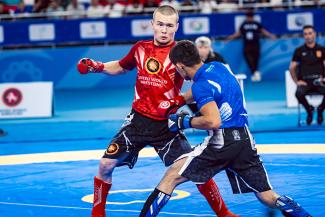Steveson Stuns Olympic Champion Akgul; Mukaida, Sidakov Reach Semis
Thursday, August 5, 2021 - 08:14 By Vinay Siwach

CHIBA, Japan (August 5) --- USA entered Kyle DAKE (USA) and Gable STEVESON (USA) as their biggest hopes to enter the final and do the golden double. After the morning session Thursday at the Makuhari Messe Hall A, only one has that chance.
Dake fell to his worst defeat at the international level, losing 10-0 to Mahamedkhabib KADZIMAHAMEDAU (BLR) in the 74kg quarterfinal.
The two-time world champion, known for his powerful lifts and throws, got a taste of his own medicine when he was tossed around by the Belarusian wrestler, earning him a semifinal spot against Frank CHAMIZO (ITA).
Steveson at 125kg was in a zone of his own as he defeated defending champion Taha AKGUL (TUR) 8-0 in the quarterfinal to keep his gold medal hopes alive at his maiden Olympics. He will face Lkhagvagerel MUNKHTUR (MGL) in the semifinals. The Mongolian wrestler notched up a 6-5 win over Gennadij CUDINOVIC (GER).
Steveson's pace and athleticism was unmatchable for his two opponents as Aiaal LAZAREV (KGZ) found out in the first match. The USA wrestler decimated him in the first period to win 10-0.
If he wins his semifinal he will face the winner of Geno PETRIASHVILI (GEO) and Amir ZARE (IR) who wrestle it out in the other semifinal at 125kg in what will be a big test for Iran's young star Zare.
World champion Petriashvili opened the day with a win over Diaaeldin ABDELMOTTALEB (EGY) before ending the bid of Zhiwei DENG (CHN) in the quarterfinals. It won't be a cakewalk for him in the semifinals as Zare has a win over Petriashvili back in 2018 when he pinned him in the Iran league.
At 74kg, apart from the unexpected loss of Dake, world champion Zaurbek SIDAKOV (ROC) took a step closer to the Olympic title as he reached the semifinal and will wrestle Daniyar KAISANOV (KAZ).
Sidakov will have to wrestle his best against Kaisanov especially after giving up six points against Bekzod ABDURAKHMONOV (UZB) in the 13-6 win.
Kaisanov ended local hopes as he pinned Keisuke OTOGURO (JPN) in the first round. He followed that up with a come-from-behind 8-5 win over Amr Reda Ramadan HUSSEN (EGY).
Kadzimahamedau had two of the most contrasting wins as he struggled to get past Jeandry GARZON CABALLERO (CUB) in the opening round. After leading, he gave up a big throw. But his crafty skills at the edge helped him secure a 12-8 win.
But against Dake, he managed to take the upper hand with two big throws from body looks which even Dake tried finishing but failed.
In the women's 53kg weight class, a fourth clash between Mayu MUKAIDA (JPN) and Vinesh PHOGAT (IND) will not take place as the latter suffered a loss via fall against Vanesa KALADZINSKAYA (BLR) in the quarterfinal.
Phogat, who looked a shadow of herself from past tournaments, defeated Rio bronze medalist Sofia MATTSSON (SWE) 7-1 in the opening round but could not outperform Kaladzinskaya.
The Belarus wrestler's defence and power were too much for Phogat as she defended a tripod position denying the Indian two points which could have shifted the momentum for her. At 5-3 and time running out, Phogat tried her tricks and when trying to do a front headlock, ended up with her back on the mat.
Kaladzinskaya will face Qianyu PANG (CHN) in the semifinal. The China wrestler defeated Jacarra WINCHESTER (USA) in the quarterfinals 6-2. The match was more or less decided in the first period when Pang got a takedown and two rolls with arm traps. Winchester's takedown in the end was not enough for her.
The last time the Pang and Kaladzinskaya met, the Chinese wrestler had a victory via fall but the Belarussian will like to avenge that loss and secure a place in the final.
The winner for the semifinal will get Mukaida or Bolortuya BAT OCHIR (MGL) as they wrestle in the other semifinal. Both have looked in great shape going into this bout as Mukaida secured a 10-0 win in the first bout and then a 12-2 win over Roksana ZASINA (POL) in the quarterfinal.
Bat Ochir has also dominated her opponents as he began with a win via fall followed by a 15-5 hammering of Luisa VALVERDE MELENDRES (ECU) in the quarterfinal.


Share your thoughts.
Comments